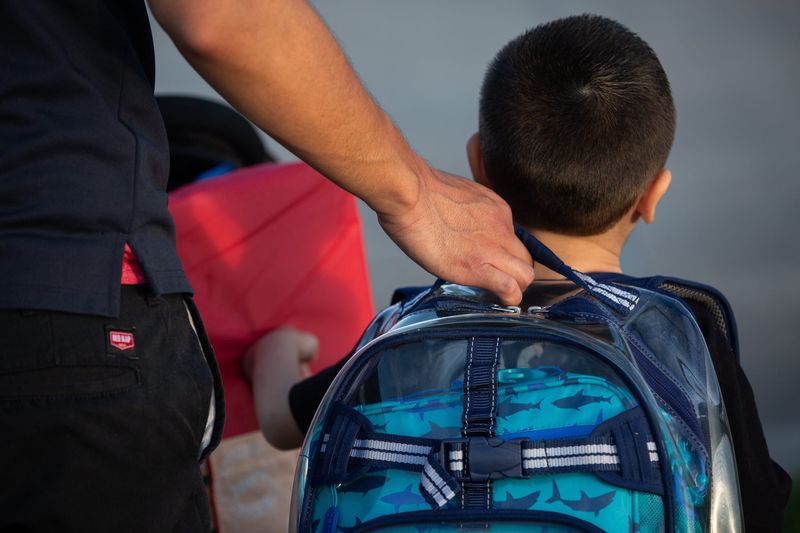Next year, some Texas families will have the opportunity to home-school or send their children to private school on the state’s dime.
Texas lawmakers approved the school voucher program in the spring with the expectation that funds will be made available to families for the 2026-27 school year. The state has taken steps to start designing the Texas Education Freedom Account program, but there’s still a lot of unknowns.

Here’s what we know and what we’re still waiting to find out about Texas’ education savings account program:
How can families use the funds?
Children accepted into the program will be able to use state funds for private school tuition, educational expenses for home schoolers, tutoring, and career and technical education programs.
Funds can even be used for online or out-of-state programs if the provider is approved by the state.
The state program will be audited by a private entity annually, and the Texas State Auditor’s Office will perform periodic audits to ensure funds are being used for approved expenses.
Which private schools will participate?
In order for families to use the funds for private school tuition, schools will have to apply to take part. The tentative date for when schools will be able to register is Dec. 2, 2025, according to reporting from The Texas Tribune.
Because the school approval process hasn’t begun yet, families don’t yet know which schools they might be able to choose from. But the state’s eligibility rules for private schools provide some hints.
Participating private schools must be accredited by an organization recognized by the Texas Private School Accreditation Commission or the Texas Education Agency.
Several Corpus Christi private schools are already accredited by members of this commission, including Annapolis Christian Academy, Arlington Heights Christian School, Coggin Memorial School, Dr. A Martinez Bilingual Academy, Grace Temple Christian Academy, Reclaim Private Schools, Spirit Life Academy and several campuses under the Diocese of Corpus Christi.
The commission accepts accreditations offered by several organizations whose standards differ.
But according to the commission website, accredited private schools are expected to meet standards comparable to state standards, including compliance with applicable statutes, effective administration and governance, teaching a balanced curriculum, hiring qualified instructional leaders with college degrees and student achievement.
Additionally, private schools must administer a nationally recognized norm-referenced assessment — a type of test that compares a student’s performance to that of their peers — to participating students in grades three to 12 to participate.
Annapolis Christian Academy head of school Travis Lockyer said that the faith-based Corpus Christi school does plan to apply and is “cautiously optimistic” about the program.
Lockyer said the school is concerned about government entanglement, and it might step back if the program changes to include regulations that could impact curriculum, hiring or vaccination requirements.
The school is accredited by the Association of Classical Christian Schools. Students take the PSAT and SAT, as well as the Classical Learning Test.
Rebecca Hammel, superintendent of schools for the Diocese of Corpus Christi, said that 10 Catholic schools in the diocese intend to participate. Incarnate Word Academy, which has an elementary, middle and high school and is independent from the other diocese schools, is still deciding, Hammel said.
All of the Diocese of Corpus Christi schools are accredited through the Texas Catholic Conference of Bishops Education Department. Additionally, students take Iowa Assessments standardized tests, as well as the PSAT and SAT.
The Catholic schools have already begun application season, Hammel said, when parents are invited to check out schools. Parents are invited to apply early, Hammel said, but will not need to officially register at the Catholic schools until they know if their children will receive funds from the state.
Hammel said that the Catholic schools have already seen increased interest this application season.
Hammel is encouraging parents interested in private school to apply for the Texas Education Freedom Account program even if they are unsure if they will make the cut for funding.
“That will help our legislators know of the great interest in this program,” Hammel said.
The amount private school students could receive would fully cover tuition in the Diocese of Corpus Christi schools, Hammel said, potentially leaving funds to cover uniforms, school meals and other educational expenses.
Hammel said that the Catholic school system is pleased with the state’s program.
“First, it’s identifying parents as the primary educator of their child,” Hammel said. “That is a foundational tenet of Catholic education.”
Hammel and Lockyer both said that is important for families to research their options and to understand whether a specific school is a good fit for them.
Hammel said that special education services differ across the local Catholic schools depending on resources, with some serving students with dyslexia, dysgraphia, autism and ADHD.
“That’s why we encourage parents to have that conversation through this admission season, because the worst thing we could do is accept a student and not be able to meet their needs fully,” Hammel said.
Any new pop-up schools won’t be able to participate initially. Schools must be in continuous operation for at least two school years before the program will cover tuition costs.
Compared to Texas public schools, there is less public, easily accessible information on private schools. The Texas Education Agency oversees public and charter schools, with accountability focused on academic outcomes, safety and security, financial security, school governance and educator hiring standards.
State and federal laws also dictate how public schools educate students with disabilities and bilingual students. Private schools do not have to accept all students.
Additionally, public schools are governed by locally elected school boards, with meetings open to the public.
How much money can a family get?
Eligible private school students could potentially receive about $10,800. The exact amount will be determined by the Texas Education Agency in January, but state law limits the amount to 85% of the statewide average amount of state and local funding per student in Texas public schools.
Students with disabilities who have an individualized education plan on file with their school district may receive up to $30,000 per year.
This element has raised questions for current private school families whose children with disabilities are not in public school, Hammel said.
Home-schooled students are expected to receive up to $2,000 per year. This can go toward qualified expenses like tutoring, books and dual credit courses. There is no testing requirement for home school families to receive funds.
Families who receive an education savings account won’t receive money directly. Families will use an online portal to select approved schools, vendors and services providers.
Which children are eligible?
Children are eligible to participate if they are U.S. citizens or legal residents who are eligible to attend a Texas school district or open-enrollment charter school or pre-K program. This includes children whose parents are active-duty members of the U.S. armed forces and Texas residents.
In order to receive funds, parents must first submit an application. This includes natural or adoptive parents, managing or possessory conservators, legal guardians, custodians or other persons with legal authority to act on behalf of a child.
Whether or not all families who apply for funds are chosen will depend on the amount of applications the state receives.
The state has set aside $1 billion for the program initially.
If applications exceed available funding for the program, state law has outlined which children will receive priority:
Siblings of any children already accepted into the program will also be accepted.
If applications exceed available funding, the state will establish a waitlist based on the priorities listed above.
For 2025, 200% of the federal poverty guidelines amounts to $42,300 for a two-person household, $53,300 for a three-person household, $64,300 for a four-person household, $75,300 for a five-person household and $86,300 for a six-person household. The amount continues to increase with the size of the family.
For 2025, 500% of the federal poverty level amounts to $105,750 for a two-person household, $133,250 for a three-person household, $160,750 for a four-person household, $188,250 for a five-person household and $215,750 for a six-person household.
This means that the restriction that no more than 20% of the funding go to families at 500% of the federal poverty level would primarily apply to families making six figures annually, with the exact cutoff rising with family size.
Hammel said that among Catholic school students who applied for financial aid, 49% are at or below 200% of the poverty level and 39% are between 200% and 500%.
Families will not need to reapply every year if they are accepted.
Who’s in charge of the program?
The Texas comptroller of public accounts, the state’s chief tax collector, accountant and treasurer, is responsible for administering the Texas Education Freedom Accounts program.
The office has an online webpage with more information about the program at comptroller.texas.gov.
In October, the comptroller’s office named technology company Odyssey as the organization that will help the state administer the program.
State law allows the company to receive up to 5% of the program’s funding.
Odyssey will manage an online parent portal for the application process.
When can families sign up?
Applications for the program are expected to open in early 2026.
Parents will be able to use the Odyssey parent portal to search for eligible schools and service providers and access their accounts to pay for eligible education expenses.
According to reporting from the Texas Tribune and ProPublica, the state’s $52 million contract with Odyssey sets Feb. 4, 2026, as the date when it will start receiving parent applications. Applications would stay open until mid-March.
How will public schools be impacted?
The Texas Education Freedom Account program does not draw funding directly from public schools. However, because public school funding is based on how many students a school serves, public school revenues can drop when students leave.
The system is based primarily on attendance, with public schools receiving a certain amount per average daily attendance.
In the Corpus Christi Independent School District, student enrollments have already fallen, dropping by more than 1,000 students between 2024-25 and 2025-26. Over the past six years, it has lost more than 4,200 students. The district has operated under deficit budgets for several years, with costs higher than the funding it receives from local taxpayers and the state and federal governments.
Corpus Christi ISD is considering several school closures beginning in 2026.
All of this is occurring before any parents have begun receiving state funds to educate their child at home or in private school.
If the voucher program encourages more families to move their kids out of public school, districts like Corpus Christi ISD could see a financial impact.
What is still unknown?
The state is expected to release further information about the program in December and January.
Until applications are completed and approved, community members won’t know which private schools are participating and how many local students might participate.
Students who receive funds might already be home-schooled or in private schools, or they might come from public schools.
This article originally appeared on Corpus Christi Caller Times: Texas school vouchers coming 2026. Here’s what we know and what we don’t
Reporting by Olivia Garrett, Corpus Christi Caller Times / Corpus Christi Caller Times
USA TODAY Network via Reuters Connect


